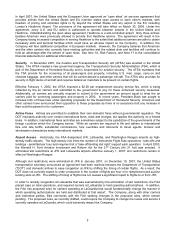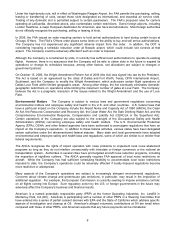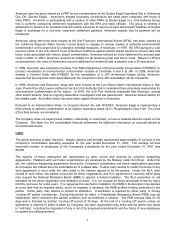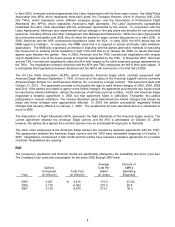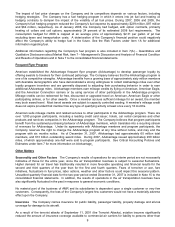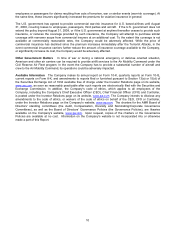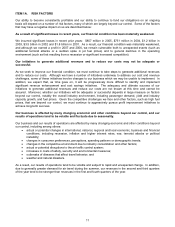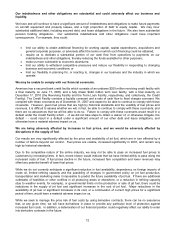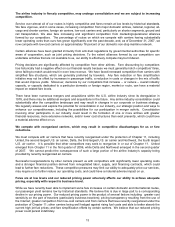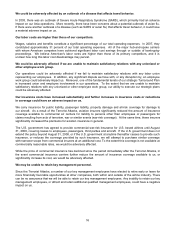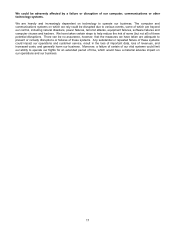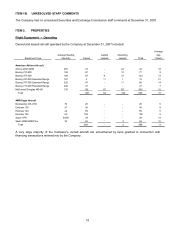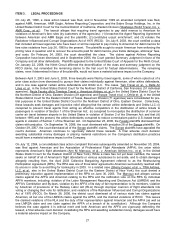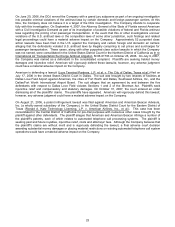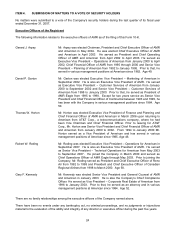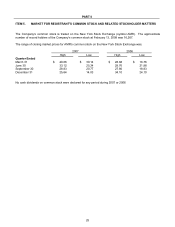American Airlines 2007 Annual Report Download - page 18
Download and view the complete annual report
Please find page 18 of the 2007 American Airlines annual report below. You can navigate through the pages in the report by either clicking on the pages listed below, or by using the keyword search tool below to find specific information within the annual report.15
Moreover, additional laws, regulations, taxes and airport rates and charges have been enacted from time to time
that have significantly increased the costs of airline operations, reduced the demand for air travel or restricted the
way we can conduct our business. For example, the Aviation and Transportation Security Act, which became law
in 2001, mandated the federalization of certain airport security procedures and resulted in the imposition of
additional security requirements on airlines. In addition, many aspects of our operations are subject to
increasingly stringent environmental regulations, and concerns about climate change, in particular, may result in
the imposition of additional regulation. For example, the European Commission is currently seeking to impose
emissions controls on all flights coming into Europe. Laws or regulations similar to those described above or
other U.S. or foreign governmental actions in the future may adversely affect our business and financial results.
The results of our operations, demand for air travel, and the manner in which we conduct our business each may
be affected by changes in law and future actions taken by governmental agencies, including:
• changes in law which affect the services that can be offered by airlines in particular markets and at
particular airports;
• the granting and timing of certain governmental approvals (including foreign government approvals)
needed for codesharing alliances and other arrangements with other airlines;
• restrictions on competitive practices (for example court orders, or agency regulations or orders, that
would curtail an airline’s ability to respond to a competitor);
• the adoption of regulations that impact customer service standards (for example new passenger security
standards, passenger bill of rights); or
• the adoption of more restrictive locally-imposed noise restrictions.
In addition, the air traffic control (ATC) system, which is operated by the FAA, is not successfully managing the
growing demand for U.S. air travel. U.S. airlines carry about 740 million passengers a year and are forecasted to
accommodate a billion passengers annually by 2015. Air-traffic controllers rely on outdated technologies that
routinely overwhelm the system and compel airlines to fly inefficient, indirect routes. The Company supports a
common-sense approach to ATC modernization that would allocate costs to all ATC system users in proportion to
the services they consume. The Company expects the U.S. Congress to address the reauthorization of
legislation that funds the Federal Aviation Administration in 2008, which includes proposals regarding upgrades to
the ATC system.
We could be adversely affected by conflicts overseas or terrorist attacks.
Actual or threatened U.S. military involvement in overseas operations has, on occasion, had an adverse impact
on our business, financial position (including access to capital markets) and results of operations, and on the
airline industry in general. The continuing conflict in Iraq and Afghanistan, or other conflicts or events in the
Middle East or elsewhere, may result in similar adverse impacts.
The Terrorist Attacks had a material adverse impact on us. The occurrence of another terrorist attack (whether
domestic or international and whether against us or another entity) could again have a material adverse impact
on us.
Our international operations could be adversely affected by numerous events, circumstances or
government actions beyond our control.
Our current international activities and prospects could be adversely affected by factors such as reversals or
delays in the opening of foreign markets, exchange controls, currency and political risks, environmental
regulation, taxation and changes in international government regulation of our operations, including the inability to
obtain or retain needed route authorities and/or slots.
For example, in April 2007, the United States and the European Union approved an “open skies” air services
agreement that provides airlines from the United States and EU member states open access to each other’s
markets, with freedom of pricing and unlimited rights to fly beyond the United States and any airport in the EU
including London’s Heathrow Airport. The provisions of the agreement will take effect on March 30, 2008. The
agreement will result in the Company facing increased competition in serving Heathrow to the extent that
additional carriers are able to obtain necessary slots and terminal facilities, which could have an adverse impact
on the Company.


